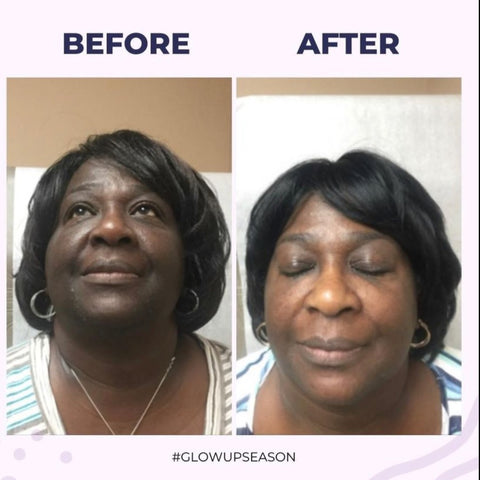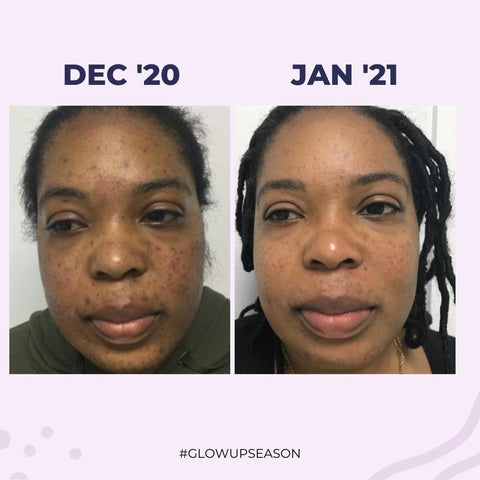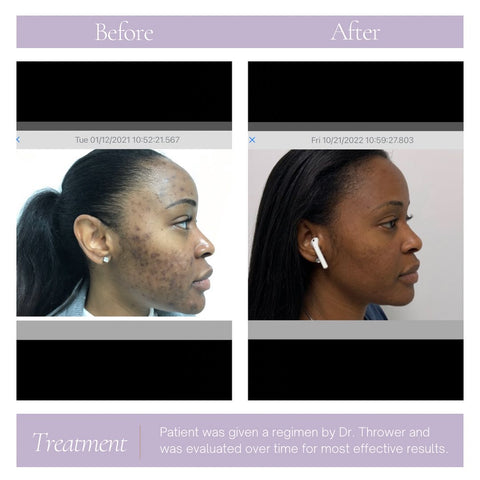
In skin care, hyperpigmentation poses a unique challenge, especially for individuals with melanin-rich skin tones. Today, we'll unravel the intricacies of hyperpigmentation and introduce effective management methods curated for those seeking to maintain their skin's radiance confidently.
What’s Hyperpigmentation?
Hyperpigmentation is like the unwanted guest that never seems to leave the party. It's the darkening of certain areas of the skin due to an overproduction of melanin, the pigment responsible for our skin's color.
What Causes Hyperpigmentation in Black Skin?
Melanin, the pigment responsible for determining skin color, hair color, and eye color, is a natural defense against the harmful effects of sun ultraviolet (UV) radiation.
Hyperpigmentation is more commonly observed in darker skin tones due to the higher levels of melanin. This heightened melanin production can be triggered by various events, including:
Sun Exposure: UV radiation from the sun stimulates melanocytes to produce more melanin. While offering some natural protection, melanin-rich skin can still become overwhelmed by prolonged or intense sun exposure, leading to sunspots or uneven pigmentation.
Hormonal Changes: Hormonal fluctuations, such as those occurring during pregnancy (melasma or "pregnancy mask") or as a result of birth control pills, can trigger increased melanin production and cause hyperpigmentation.
Inflammation: Any form of skin inflammation, whether from acne, eczema, or injury, can trigger melanin production as a part of the skin's natural defense mechanism. This can result in post-inflammatory hyperpigmentation (PIH).
Genetics: Genetic predisposition can play a role in hyperpigmentation. Some individuals may inherit a tendency to develop dark spots more easily.
Skin Conditions: Certain skin conditions, like melasma, are more common in melanin-rich skin types and are characterized by uneven pigmentation.
Prevention and Minimization Methods for Hyperpigmentation
While hyperpigmentation often receives a negative reputation, it's important to note that it isn't harmful. However, treatments do exist if you wish to eliminate dark spots.
Correcting dark spots and maintaining an even tone requires efforts beyond the most effective hyperpigmentation treatments. It takes continuous and consistent commitment to preventative measures.
So, if you actively seek solutions to address hyperpigmentation, we invite you to continue reading. But before delving into our recommendations, consider these initial pieces of advice:
Wear Sunscreen
In the arsenal against hyperpigmentation, sunscreen stands as a crucial defense. Its daily application is paramount, given that UV radiation from the sun can worsen hyperpigmentation and stimulate further melanin production, intensifying these unwanted blemishes. Choose a broad-spectrum sunscreen with at least SPF 30 to ensure comprehensive protection for your skin.
Exfoliate Your Skin
Exfoliation is a key strategy for addressing hyperpigmentation. Opt for gentle exfoliants like scrubs, alpha hydroxy acids (AHAs) or beta hydroxy acids (BHAs) to unveil revitalized, radiant skin beneath the surface. However, exercise caution to prevent over-exfoliation, leading to skin irritation and further hyperpigmentation.
Avoid Sun Exposure
In addition to sunscreen, prevent hyperpigmentation by shielding your skin from the sun. Avoid direct exposure to the sun, especially at peak hours, between 10 a.m. and 4 p.m., when sun rays are the strongest. Seek shade whenever possible and wear protective clothing like long sleeves and UV-protective sunglasses.
Proper Skincare Regimen
Maintain healthy skin with a consistent routine. Use a gentle cleanser, moisturize to prevent irritation, and include antioxidants like vitamins C and E. At night, consider retinoids or AHAs for skin cell turnover.
Avoid Picking at Blemishes
Don't pick blemishes to prevent inflammation and scarring, which can lead to more hyperpigmentation. Practice patience and allow your skin to heal naturally. Most blemishes resolve independently with time and proper care, so cultivating patience is key to preventing complications, including hyperpigmentation.
The Most Potent Treatments for Hyperpigmentation in Black Skin
Now, the moment you’ve been waiting for: treatments!
The most suitable recommendations for treatments aimed at fading dark spots come from a dermatologist. They possess the expertise to pinpoint the root cause of hyperpigmentation and devise a tailored treatment plan accordingly.
In the 90s, Dr. Thrower spent years developing effective treatments for hyperpigmentation in ethnic skin, an issue he had at heart to resolve.
Today, 30 years later, these products are some of the most praised by hundreds of thousands of customers!
Take a look at these stunning before and afters of patients using Perfect Tone Cream, PBC (Rx) and recommended skincare regimens:




Shop the Hyperpigmentation Range
Regain your even skin tone with the #1 dermatologist-developed hyperpigmentation products on the market:

